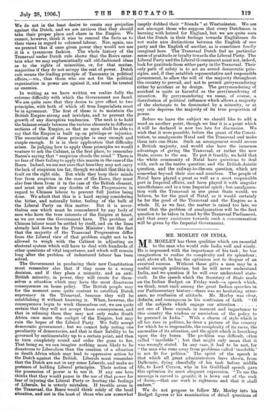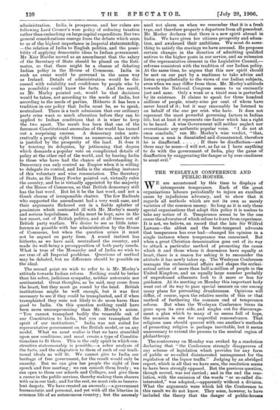MR. MORLEY ON INDIA.
MR. MORLEY has three qualities which are essential to the man who would rule India well and wisely. He is impressed with the importance of his task ; he has imagination to realise its complexity and its splendour ; and, above all, he has the optimism not to despair of an eventual success. Without these gifts a man may be a useful enough politician, but he will never understand India, and. we question if he will ever understand state- craft. In the speech which the Secretary of State made on the Indian Budget on Friday week—a speech which, we think, must rank among the great Indian speeches in our Parliamentary history—there was no hesitating utter- ance, no confusion of attitude. Mr. Morley was clear, definite, and courageous in his confession of faith. "Of all the subjects which engage our attention not one of these exceeds in moment and. importance to this country the wisdom or unwisdom of the policy to be pursued in India." With a charm of style which is all too rare in politics, he drew a picture of the country for which he is responsible, the complexity of its races, the anomalies of its situation, and the spirit which is breathing upon the dry bones. The problem was difficult, often called " insoluble " ; but that might only mean that it was wrongly stated. In any case, it had to be met, for "the man who runs away from problems called 'insoluble' is not fit for politics." The spirit of the speech is that which all great administrators have shown, from Dalhousie, dying cheerfully of his task before middle life, to Lord Curzon, who in his Guildhall speech gave this optimism its most eloquent expression. "To me the message is carved in granite, it is hewn out of the rock of doom,—that our work is righteous and that it shall endure."
We do not propose to follow Mr. Morley into his Budget figures or his examination of detail questions of administration. India is prosperous, and her rulers are following Lord Cromer's wise policy of reducing taxation rather than embarking on large capital expenditure. But two general considerations emerge from the debate which seem to us of the highest importance in Imperial statesmanship, —the relation of India to English politics, and the possi- bility of applying democratic ideas to Indian government. Mr. Keir Hardie moved as an amendment that the salary of the Secretary of State should be placed on the Esti- mates, so that there might be a chance of debating Indian policy in the House of Commons. India in such an event would be governed in the same way as Ireland. Details of administration would be dis- cussed with volubility and confidence by people who by no possibility could know the facts. And the result, as Mr. Morley pointed out, would be that decisions would be taken, not according to the needs of India, but according to the needs of parties, Hitherto it has been a tradition in our policy that India must be, so to speak, neutralised. There is a tacit admission that our ordinary party cries want so much alteration before they can be applied to Indian conditions that it is wiser to keep the two apart. The result has been that one of the foremost Constitutional anomalies of the world has turned out a surprising success. A democracy rules auto- cratically a people eight times as numerous, and, the rule is justified by the prosperity of the land. It does it by trusting its delegates, by jettisoning that dogma which demands a, popular vote on complicated details of policy at the other end of the world, and by leaving India to those who have had. the chance of understanding it. Democracy can only control an Empire when it is willing to delegate its control, and India is the standing instance of this voluntary and wise renunciation. The Secretary of State, as Sir Henry Fowler pointed out, virtually rules the country, and he is virtually appointed by the majority of the House of Commons, so that British democracy still has the last word. But let it be the last word, and not a Greek chorus of irresponsible chatter. The few Radicals who supported the amendment had a very weak case, and their arguments flickered out in a feeble splutter of pessimism which contrasted ill with Mr. Morley's manly and serious hopefulness. India must be kept, save in the last resort, out of British politics, and at all times out of British party warfare. We desire to see as little inter- ference as possible with her administration by the House of Commons, but when the question arises it must not be argued on party lines. A sound instinct has hitherto, as we have said, neutralised the country, and made its well-being a presupposition of both party creeds. What is true of the Monarchy and of India we wish to see true of all Imperial problems. Questions of method may be debated, but no difference should be possible on the ideal.
The second point we wish to refer to is Mr. Morley's attitude towards Indian reform. Nothing could be better than his sober, judicious sympathy, neither autocratic nor sentimental. Great thoughts, as he said, may come from the heart, but they must go round by the head. British institutions -might be well enough, but it was first necessary to see if they could be transplanted, and if when transplanted they were not likely to do more harm than good to India. On this question nothing could have been more uncompromising than Mr. Morley's axiom. " You cannot transplant bodily the venerable oak of our Constitution to India, but you can transplant the spirit of our institutions." India was not suited for representative government on the British model, or on any model. What we must realise is that we have stumbled upon new conditions, and must create a type of Constitu- tionalism to fit them. This is the only spirit in which con- structive statesmanship is possible,—a sober analysis of the facts, and the adaptation to them of such of our tradi- tional ideals as will lit. We cannot give to India our heritage of free government, for the result would only be anarchy. But we can give her people the right of free speech and free meeting ; we can consult them freely ; we can open to them our schools and Colleges, and give them a career in the public services, thereby making them sharers with us in our task; and for the reit, we must rule as benevo- lent despots. We have created an anomaly,—a government bureaucratic and personal, and yet with all the liberties in common life of an autonomous country ; but the anomaly need not alarm us when we remember that it is a fresh type, and therefore properly a departure from all precedent. Mr. Morley declares that there is a new spirit abroad in India. We have given her citizens prosperity and educa- tion, and awakened their ambitions. We must do some- thing to satisfy the cravings we have aroused. He proposes certain changes in the direction of admitting qualified natives to the higher posts in our service, and an extension of the representative element in the Legislative Council,— reforms consistent with the tradition of our Indian policy. At the same time, he argues that this new spirit should be met on our part by a readiness to take advice and listen sympathetically to the views of our Indian subjects, even when we may differ from them. Mr. Morley's attitude towards the National Congress seems to us eminently just and sane. Only a weak or a timid man is perturbed by its existence. It claims to speak for three hundred millions of people, ninety-nine per cent. of whom have never heard of it; but it may reasonably be listened to on behalf of the one per cent, who have. It does not represent the most powerful governing factors in Indian life, but at least it represents one factor which has a right to be heard. A wise Government will neither neglect nor overestimate any authentic popular voice. " I do not at once conclude,' ran Mr. Morley's wise verdict, "that, because a man is dissatisfied and discontented, therefore he is disaffected If there be disaffection—and there may be some—I will not, as far as I have anything to do with the government of India, play the game of disaffection by exaggerating the danger or by over-readiness to scent evil."







































 Previous page
Previous page